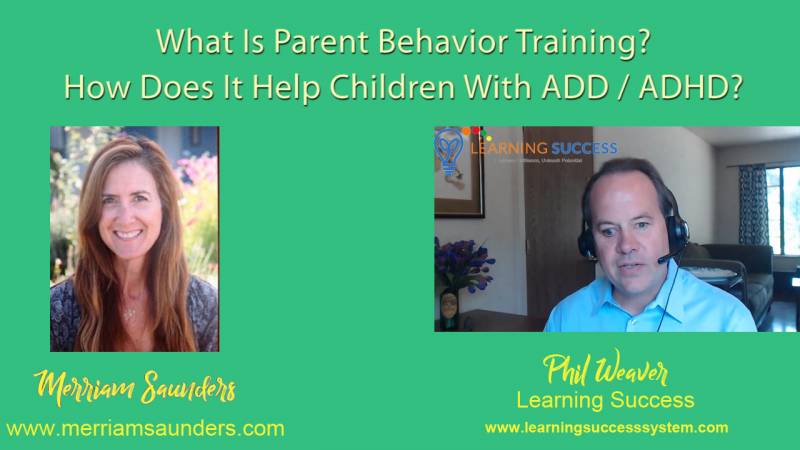
Phil: Interesting. What is parental behavior training?
Merriam: Well, it's very, very specific to, you know, that particular family. because there are a lot of factors involved in what they might need, including, you know, does this child have a comorbid learning disorder or depression and anxiety? Are there siblings in the household? Are they younger or older? has the child been diagnosed and for how long has the child aware of their diagnosis? Things like that. And then beyond that, you know, what are the particular behaviors that are causing the most impairment, not only in school but also with the family dynamics. and then we just start to attack those one by one. And the first thing we look at is, is how is the parent reacting to those behaviors? Because nine times out of 10, the reaction is one that you might give to a neurotypical child that ought to quote unquote know better.
Merriam: And it's just not a helpful reaction for a child with an impulse control disorder because they didn't really, they couldn't control what they did, asking them to not do it again or punish them because of something they did generally just won't have an impact. And so the parent and child line of getting more and more and more frustrated.
Phil: Is this a form of therapy or more education?
Merriam: I really like to call it more a training. Therapy is working more on your emotional side. And, and this really is more specific to, okay, let's problem solve. Let's, let's look at what are you doing and how can you do it differently to get a different outcome?
Phil: Finding what works. Why would it not work?
Merriam: You know, unfortunately, parenting a child with Adhd in particular is exhausting. It takes a lot of forethought, a lot of what I call preventative parenting. you're, you're having to be two steps out of your child and really thinking about, okay, we're going to have a barbecue on Sunday. It's, you know, 1:30 does my, you know, my child might be really tired because that's when they nap. Or at my child might be really hungry and hate the food at the barbecue. Like just really, really thinking ahead or maybe even deciding barbecues to start in our future at the moment. A lot of parents are in a state of denial. They don't want their lives to be impacted like that. They want to go to that barbecue and they, they want their child to just do what they're told. So they will fight the fact that actually they're the ones that have to change first and change is difficult. You know, you're often, this isn't the road that they thought they would be on. It's not what they signed up for. there are a lot of parents that, you know, just really wished somebody could work with their child and change their child. and yeah, and it just, unfortunately, it's not that easy.
Phil: Yeah. When we, when we shut down, we ran our country school for 20 years and it was really hard, we hated to shut it down. We had to. And a few parents came to us and said, "who will discipline my child now?"
Merriam: Yeah.
Phil: I really, I just like, we had no answer. We didn't know what to do, so I would have given him your number.
Merriam: Oh Gosh. Yeah, no, it's, I've been there. You know, I had, I have two of my three have ADHD and I remember those years and they were not easy or fun. It's really hard. And you know, most people who don't have kids with issues don't understand how hard it is either. Parents will frequently have a sense of some kind of parenting failure, you know, like if I had only done something differently or be different, or shame, you know, I can't bring my kid to a barbecue because he's probably gonna have a meltdown, crawl under the table. and, and there's a lot of judgment by, you know, people who don't understand, why can't you, why can't your child behave, you know why it's, Gosh.
Get the full interview here
Do You Need help with a Learning Difficulty?
Our simple online analysis will help you get to the core of the problem and find the right solution for you.
Understanding how to help someone with a learning difficulty starts with understanding which micro-skills are affected. When you learn which of the micro-skills is the problem, you will then be on your way to solving it.
You'll also learn how to:
- Build confidence
- Enhance Learning ability
- Eliminate avoidance
- Build grit
You can get this analysis for free by filling out this simple form. This will help you get to the bottom of a learning difficulty and provide you with a solution. If you are ready to put this problem behind you click the button below and fill out the form.










